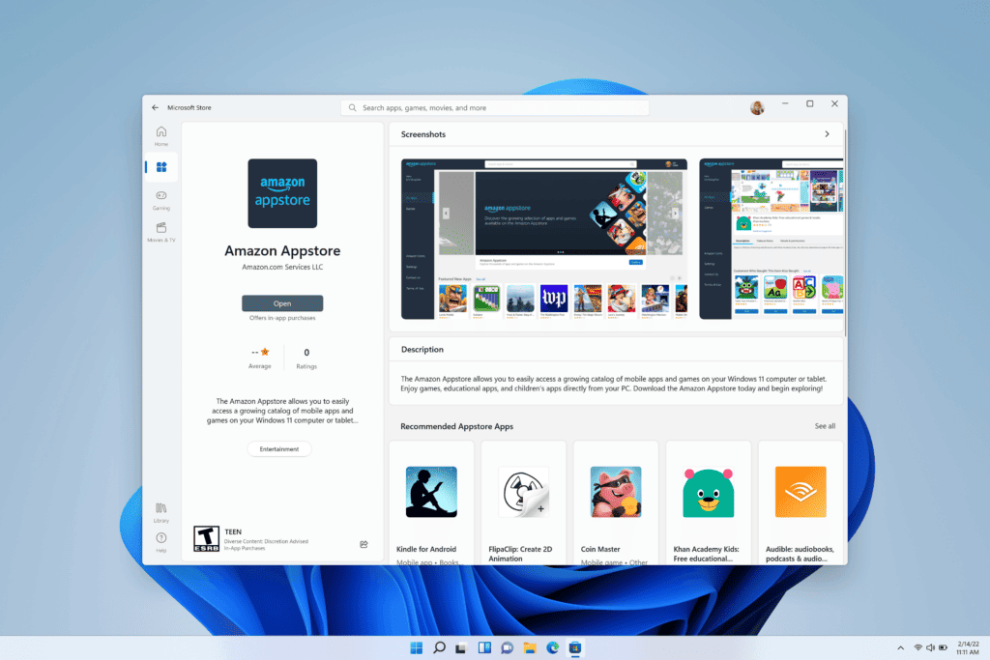In a move that has shocked many in the tech world, Microsoft has announced that it is ending support for Android apps on Windows. The Windows Subsystem for Android (WSA), which allowed users to run Android apps natively on their Windows PCs, will no longer be supported after March 5, 2025. Existing users can continue using any Android apps they have already installed up until that date, but no new Android apps will be made available for download on Windows.
This announcement represents a major strategic shift for Microsoft, and will undoubtedly have a significant impact on the many Windows users who have come to rely on WSA to access their favorite Android apps on their PCs. While Microsoft has not disclosed exact user numbers, it’s clear that WSA was a popular feature that helped bridge the divide between the Windows and Android ecosystems.
Why is Microsoft Ending Support for Android Apps on Windows?
Microsoft’s decision to discontinue WSA may be driven by a few key factors:
- Lack of user demand: WSA was still in beta and not available to all Windows users. If Microsoft didn’t see strong enough adoption and usage of Android apps on Windows, it may not have been worth the continued investment.
- Technical challenges: Some users reported performance and compatibility issues when running Android apps via WSA. Providing a smooth, reliable experience across the wide range of Android apps likely proved difficult.
- Security concerns: Running Android apps on Windows opens up potential security vulnerabilities that Microsoft would need to continually monitor and patch. This may have been a liability they preferred to avoid.
- Shifting priorities: Microsoft has been heavily investing in other areas like cloud gaming and AI. They may have decided that focusing engineering efforts on more strategic initiatives was a better use of resources than continuing to develop WSA.
Regardless of their rationale, this move represents a blow to the notion of running mobile apps seamlessly on desktop operating systems. It may lead some Windows users to seek out alternative solutions.

What Are the Alternatives for Running Android Apps on PC?
Although WSA will no longer be available, Windows users still have a few options if they need to run Android apps on their PC:
- Third-party emulators: Emulators like BlueStacks and NoxPlayer allow you to run Android apps in a sandboxed environment on your PC. However, performance may vary and some apps may not be fully compatible. These emulators can also pose security risks if not kept updated.
- Dual-booting Android: For advanced users, you can install a full Android OS on a separate drive partition and dual-boot it alongside Windows. This provides a complete native Android experience, but requires significant setup and cuts into PC storage space.
- Cloud streaming: Emerging game streaming services like Microsoft’s xCloud and Google Stadia may eventually allow seamless cloud streaming of Android apps and games to any device. However, this will require subscription fees and depends on having a very fast internet connection.
- Using your actual Android phone or tablet: In many cases, the simplest solution may be to just use Android apps on an actual Android device. With cloud sync and companion apps, it’s easier than ever to smoothly transition between your Android phone and Windows PC.
Will This Decision Impact the Future of Windows?
While deprecating a major feature like WSA is never a good look, it’s unlikely to significantly dent Windows’ popularity as the dominant desktop OS. Most casual users probably never used WSA, and power users will find workarounds. However, it does erode some of the versatility and “do everything” appeal that Windows has over rival platforms like MacOS and Chrome OS.
This move also raises questions about the future of cross-device app compatibility. Microsoft and Google are now trending in opposite directions, with Google doubling down on Android app support in ChromeOS while Microsoft backs away from it in Windows.
Apple has so far avoided this conundrum by keeping their mobile and desktop app ecosystems completely separate. But with Apple silicon Macs now able to run iOS apps unmodified, the pressure may mount for Microsoft to find an alternative solution for Windows – either through cloud streaming, virtualization, or web apps.
In the short term, expect Microsoft to emphasize Progressive Web Apps (PWAs) as the preferred approach for lightweight cross-platform apps on Windows. But Microsoft developers will likely be working hard behind the scenes to cook up more robust solutions for the future.
The Bottom Line for Users
If you currently rely on Android apps for work or play on your Windows PC, this news may come as a frustrating inconvenience. You’ll need to make alternate arrangements before WSA stops working in 2025. But don’t panic – you have plenty of time to research and test other solutions like emulators or streaming.
In the grand scheme, this is a disappointing move from Microsoft that narrows Windows’ capability set. But just as the death of Windows Mobile gave rise to a cross-platform Microsoft embracing Android and iOS, the end of WSA may eventually lead to more innovative solutions for bridging Windows and Android down the line. The key is for Microsoft to stay focused on solving real user needs rather than stubbornly locking users into its own ecosystem and services.
As always, vote with your dollars and your engagement. If you believe that running Android apps on Windows is important, make your voice heard and explore alternatives. Only by understanding how users adapt and what pain points remain will Microsoft and other vendors be motivated to provide compelling solutions in the future.
















Add Comment